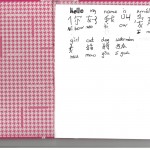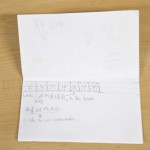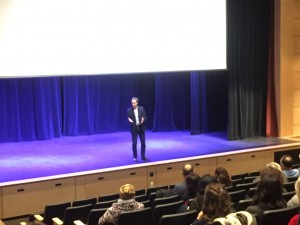 Clinical psychologist, Dr. Alex Russell visited LCC a few weeks ago and offered many important messages. He works with struggling adolescents and is the author of the book Drop the Worry Ball: Parenting in the Age of Entitlement. Let’s consider some of the key takeaways from his presentation.
Clinical psychologist, Dr. Alex Russell visited LCC a few weeks ago and offered many important messages. He works with struggling adolescents and is the author of the book Drop the Worry Ball: Parenting in the Age of Entitlement. Let’s consider some of the key takeaways from his presentation.
Dr. Russell was authoritative and direct. He noted that in Canada most parents are over-parenting and over-managing their children. We have all heard about “helicopter parents” who hover too much or “snowplow parents” who will do anything to clear the way. All parents aim to minimize bumps on the road of life and diminish anxiety for their children. But Dr. Russell reminds us that hurdles and anxiety are essential elements in the curriculum of life; they are key for balanced growth and development.
Despite the way we generally use the term, anxiety is not all bad. It can be defined as anticipatory fear in our frontal lobes, something that is unique to humans. We actually need anxiety to be successful, but what we experience is what psychologists describe as adaptive anxiety. It allows us to manage stressful situations, but we should not be frozen or immobilized by an unhealthy tsunami of anxiety.
We have to find a way to open the door to small failures. The only kind of failure we want young people to avoid is what Dr. Russell calls catastrophic failure. He reminds us that failing a test, a course, or even a grade is not nearly catastrophic and should never be treated as such. In terms of self-management, students need to learn how to cope with setbacks without being overly demonstrative or emotional. The normal challenges in life should never be treated like the end of the world.
Dr. Russell was clear: the problem with adults chronically over-managing students is that it underestimates and undermines student potential. He asserts that starting in Grade 6, students should assume full responsibility for all tasks and assignments at school – not partial, but full responsibility. Inevitably, some students will find this difficult. But when outcomes are negative, they are quite capable of adapting and taking responsibility. When things don’t go well, students can quickly learn new approaches, routines and priorities; they naturally adapt.
Essentially, Dr. Russell affirmed that students require the opportunity to explore without constant intervention and direction from parents. In his words, “students need to explore the jungle gyms of life and experience non-catastrophic failure.” That’s how they learn to climb without injury – literally and figuratively. But the responsibility is solely the student’s – it’s not shared.
So what can or should parents do? They need to give their children space and allow them to explore and learn from experience. The primary responsibility of parents is to “mind and care” – be supportive without constant direction or intervention. The key to this is for parents to trust teachers and be allies with them as they are the learning specialists.
What else does Dr. Russell suggest needs to happen? He asks students to accept their responsibilities and do their homework. They should do their best to limit procrastination and avoidance of work, which can be very problematic if it persists. But again, Dr. Russell is emphatic: when it comes to homework “parents should be screamingly absent.” Parents should show care and interest, but they should not take on any anxiety. No passing of the worry ball between parents and teachers; the anxiety should be the student’s alone.
Dr. Russell affirmed that by trying new things and being intellectually courageous students will feel anxiety in different degrees. In fact, one must pass through various states of anxiety on the way to what psychologists call flow. Again, I quote Dr. Russell, “Money doesn’t buy happiness, flow creates happiness; flow is the number one ingredient of human happiness.”
So what is flow? It is pure engagement – transformative engagement with a problem, an activity or way of thinking. Indeed, at one time or another all of our students experience flow. It could occur while they are solving a math or science problem, completing a history case study, reading a novel, playing an instrument, or participating in an athletic activity. It is engagement that is so complete, that time seemingly becomes elastic and the child is fully immersed in the activity.
One of the problems with attaining a state of flow is that in school and at work we don’t always choose our activities, and we clearly prefer some over others. In addition, school is a place where students have to live with the necessary evil of marks. They matter, but Dr. Russell asserts no one should obsess over them. Even when struggling, students can always bounce back. Rather than marks, we should all be much more focused on seeking flow.
On this front, parents and school should minimize the focus on achievement solely through marks, which we are actually discussing here at LCC. Together, students, teachers and parents should focus on embedding a positive growth mindset, promote exploration, engagement, and flow.
While at school every one of our students has experienced and will continue to experience failure, and they quite naturally take steps to learn, refine, regroup and adapt their approaches to learning.
Dr. Russell reminds us that learning and achievement is not about a “race to nowhere.” Rather, it is about welcoming anxiety in adaptive ways, and collaborating with supportive teachers who are authoritative experts in students’ lives. Parents need to simultaneously let go of control, while staying connected and interested in their children’s learning activities and what interests them.
Thank you Dr. Russell for the wise insights and great advice! We all probably have some work to do at LCC to provide our students with the space suggested here. Meanwhile, the student’s role is to be courageous, accept personal responsibility, embrace adaptive anxiety and continue to seek flow. With the right balance, we aspire that we will not only provide our children with essential learning skills, but happiness that could be lasting and impactful. – Chris Shannon, Headmaster
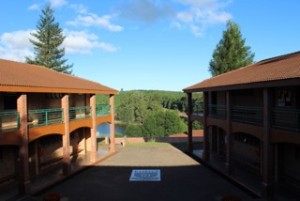 I’ve been at Stanford Lake College for a week and a half and overall my experience has been great.
I’ve been at Stanford Lake College for a week and a half and overall my experience has been great. 
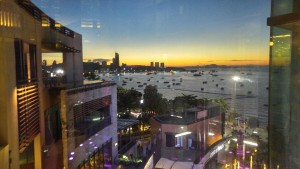 It’s been a week and half since I arrived in Thailand and I have loved every second of it so far. Between the lack of snow, the great people from all parts of the world and the fun atmosphere, I am enjoying myself and learning a lot.
It’s been a week and half since I arrived in Thailand and I have loved every second of it so far. Between the lack of snow, the great people from all parts of the world and the fun atmosphere, I am enjoying myself and learning a lot.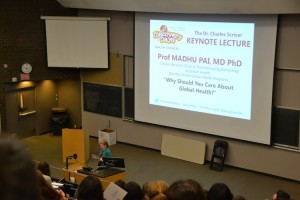 Last week, LCC students attended Discovery Days in Health Sciences at McGill University. The Discovery Days are one-day workshops that offer secondary students an opportunity to learn about the many career options in medicine and the health sciences. Here is what two students had to say about the experience:
Last week, LCC students attended Discovery Days in Health Sciences at McGill University. The Discovery Days are one-day workshops that offer secondary students an opportunity to learn about the many career options in medicine and the health sciences. Here is what two students had to say about the experience: Clinical psychologist, Dr. Alex Russell visited LCC a few weeks ago and offered many important messages. He works with struggling adolescents and is the author of the book Drop the Worry Ball: Parenting in the Age of Entitlement. Let’s consider some of the key takeaways from his presentation.
Clinical psychologist, Dr. Alex Russell visited LCC a few weeks ago and offered many important messages. He works with struggling adolescents and is the author of the book Drop the Worry Ball: Parenting in the Age of Entitlement. Let’s consider some of the key takeaways from his presentation.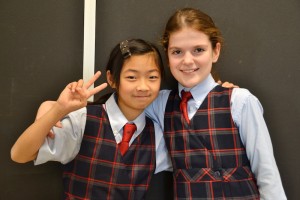 Perhaps the best indication of LCC’s success as a leader in developing open-minded, empathic and engaged citizens of the world is when students, on their own initiative, cross cultural and linguistic boundaries to gain new perspectives and a better understanding of one another. That is precisely what happened when Amélie and Kelly met in their grade 5 class.
Perhaps the best indication of LCC’s success as a leader in developing open-minded, empathic and engaged citizens of the world is when students, on their own initiative, cross cultural and linguistic boundaries to gain new perspectives and a better understanding of one another. That is precisely what happened when Amélie and Kelly met in their grade 5 class.